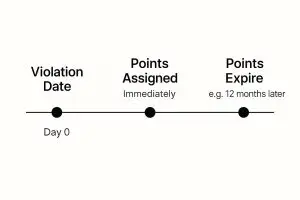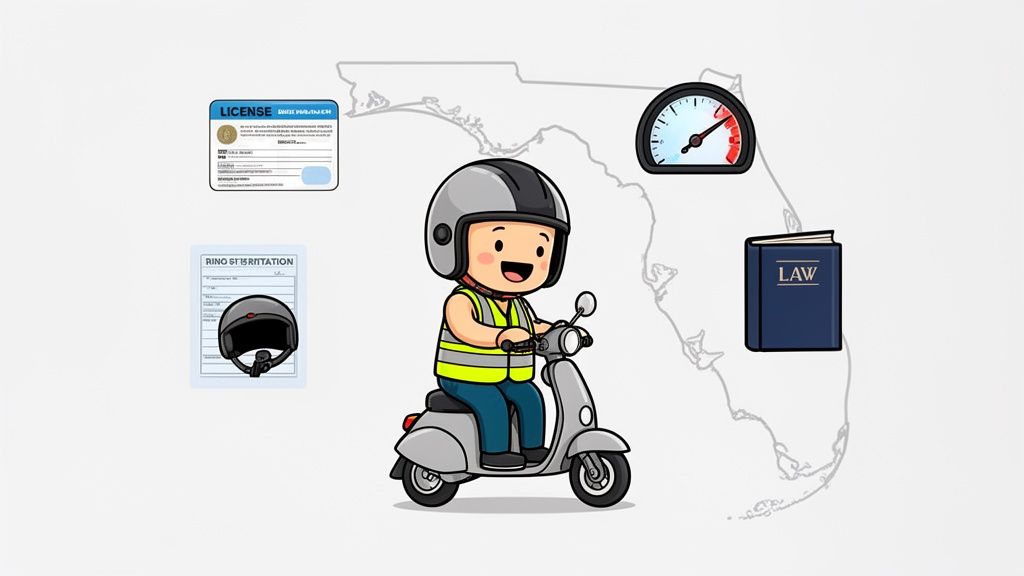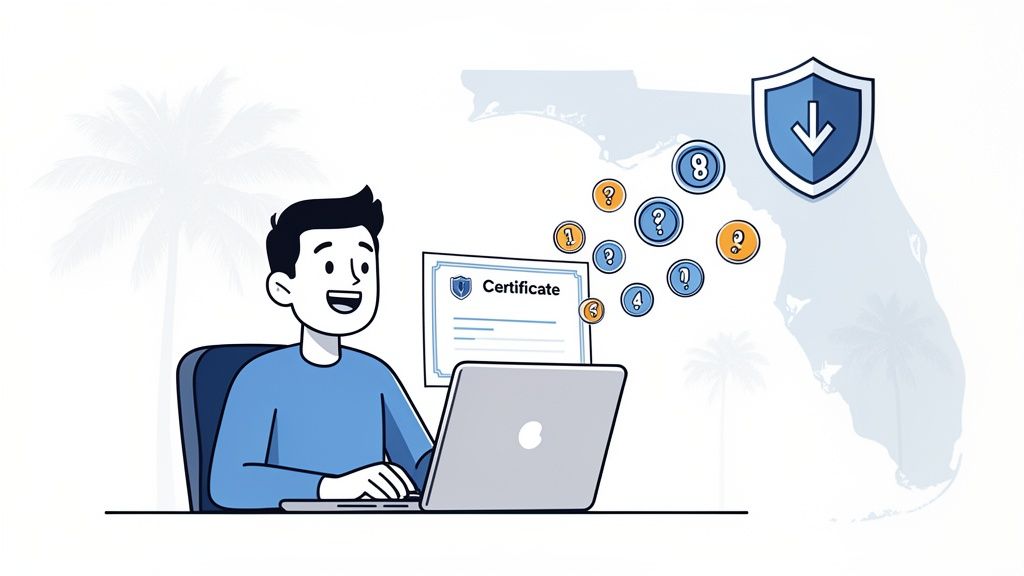Getting a traffic ticket can be stressful. Afterward, you might worry about points on your driver’s license. Many people wonder: do points go away on your license?
The simple answer is yes, they do. However, it is not as simple as just waiting. Points on your driving record are like temporary flags. How long they stay depends on your state’s laws. The seriousness of the traffic violation also matters a great deal.
How Long Do Points Actually Stay On Your License?
For most drivers, the first step is learning when points expire. This timeline is different in every state. Consequently, the time can change a lot based on the traffic offense.
A minor violation might add points for only one to three years. For example, this could be for minor speeding. In contrast, a serious offense can be very different. Things like reckless driving could add points that last for ten years or more. This all depends on where you live.
This process encourages safer driving. The main goal is to track driving habits over time. As a result, the roads are safer for everyone. For more on traffic safety statistics, you can visit the National Highway Traffic Safety Administration (NHTSA).

As you can see, points are added after a traffic conviction. Then, the countdown begins for them to fall off. Once they expire, they no longer count toward a possible license suspension.
Different Timelines for Different Purposes
Here’s where things can get a little tricky. In reality, there are a couple of different timelines you need to know.
- The DMV Timeline: This is the official clock used by your state’s Department of Motor Vehicles (DMV). This timeline decides if you are at risk for penalties like license suspension. Once points expire here, they no longer count against you for that purpose.
- The Insurance Timeline: Your insurance company uses its own rules. Insurers often look back further into your driving history. This is typically three to seven years when they set your rates. So, a past ticket could still cost you money even after points drop off your DMV record.
The actual violation itself often stays on your driving record. It can remain long after the points are gone. This dual-timeline system is why a clean record is so important. In short, it protects both your driving privileges and your wallet.
Common Timelines for License Point Expiration
This table shows typical expiration periods for driver’s license points across the United States. Timelines vary based on state laws and the specific traffic violation.
| Violation Severity | Common Expiration Period | Example Offenses |
|---|---|---|
| Minor | 1 to 3 Years | Minor speeding, improper lane change, failure to yield |
| Moderate | 3 to 5 Years | Speeding in a school zone, running a red light |
| Major | 5 to 10+ Years | Reckless driving, DUI/DWI, leaving a scene |
Understanding these general timeframes can help you know what to expect. However, you should always check the specific laws in your state. This will tell you exactly where you stand. The Governors Highway Safety Association (GHSA) offers state-by-state safety law information.
Understanding the Driver’s License Point System

So, how does this whole point system work? Think of your driver’s license like a report card. Each time you get a ticket for a moving violation, you get points added to your record.
The more serious the traffic mistake, the more points you get. These points add up over time. If you get too many points in a certain timeframe, you will face consequences. For example, getting 12 points in 12 months is a common threshold.
This could mean a warning letter or a driver safety course. It could even mean a full license suspension. The entire system is built to guide people toward safer driving habits. It makes it clear that risky behavior has real repercussions.
Why Do States Use Point Systems
Ultimately, the main goal of any point system is to keep everyone safer. State DMVs use points to identify drivers who may need extra help. It is less about punishment and more about public safety.
A point system serves a few key functions:
- It spots high-risk drivers: The system helps officials see patterns of unsafe driving. This can happen before a serious crash occurs.
- It encourages better habits: Knowing you could get points is often enough to motivate people to follow traffic laws.
- It creates a standard process: This ensures a clear and consistent way to handle traffic violations across a state.
Research shows that these systems can be effective. They can help reduce traffic incidents when they are first introduced. However, consistent enforcement and driver education are needed to maintain these safety benefits. The U.S. Department of Transportation (USDOT) provides extensive research on traffic safety programs.
How Points Lead to License Suspension
Every state has a limit on how many points you can get. Reaching that number is a major red flag for the DMV. It signals that a driver’s habits have become a danger.
A license suspension is the temporary loss of your driving privileges. It’s a serious step. It is designed to get high-risk drivers off the road while they improve their driving behaviors.
The number of points that triggers a suspension varies by state. The time frame for getting those points also differs. For instance, some states look at a 12-month period. Others might scan your record over 24 or 36 months. It is crucial to know your state’s rules to avoid such a serious penalty.
A Real-World Look at Florida’s Point System
To understand how these systems work, let’s look at a specific state. Florida provides a clear example of how points can lead to serious consequences. The state has a tiered system for license suspension.
Florida’s system is very specific about how many points trigger a suspension over different time periods. It is designed to identify and correct patterns of risky driving behavior before they lead to a serious collision.
Florida’s Suspension Thresholds
The Florida Highway Safety and Motor Vehicles (FLHSMV) sets clear rules. The length of a license suspension depends on how quickly a driver accumulates points.
Here is the simple breakdown from the official Florida driver handbook:
- 12 points accumulated in a 12-month period results in a 30-day suspension.
- 18 points accumulated in an 18-month period results in a 3-month suspension.
- 24 points accumulated in a 36-month period results in a 1-year suspension.
This system shows how Florida takes repeat offenses seriously. A single ticket might not cause a suspension. However, a series of violations in a short time will lead to strict penalties.
This hands-on example shows how a state uses its point system not just to penalize drivers but to enforce safer driving over time.
Taking Action to Manage Your Points
What if you get a ticket in Florida? The state allows drivers to take a driver improvement course in some cases. Completing an approved course can help you avoid getting points on your license for an eligible citation.
However, there are limits. For example, a driver can only take this type of course once every 12 months. You are also limited to five times in your lifetime.
This blend of penalties and educational options creates a fair system. It holds drivers accountable. It also gives them tools to learn from their mistakes and become safer on the road. You can find detailed information directly on the FLHSMV website.
Connecting License Points to Your Car Insurance Bill

Beyond issues with the DMV, points on your license can affect your wallet. Car insurance companies see points as a big risk indicator. To them, each point suggests a higher chance of a future claim.
When your policy is up for renewal, your insurer will check your driving record. If they find new points, your premium will likely go up. This is one of the biggest reasons to keep your record clean.
How Violations Affect Your Rates
Not all tickets are equal in the insurance world. Some violations cause a small increase, while others can cause a huge jump in your rates.
- Minor Violations: A simple ticket for going 10 mph over the limit will probably nudge your rates up.
- Major Violations: Something serious like a DUI can cause your premiums to skyrocket. Your rates could double or even triple.
Additionally, many insurers add a surcharge after a ticket. This is an extra fee on top of your premium. It can last for several years. One mistake can end up costing you hundreds of dollars over time.
According to the NHTSA, speeding was a factor in a staggering 29% of all traffic fatalities in 2022. That statistic is why insurers take speeding very seriously when setting your premium.
The Financial Side of Safe Driving
The link between points and insurance costs is clear. A driver with recent tickets is statistically more likely to file a claim. Insurance companies manage risk by raising rates for these drivers. This is why a clean driving record is so valuable.
Even a small increase can add up. A 10% to 20% hike on your policy could mean paying hundreds of extra dollars each year. This makes it very important to know your options after getting a ticket.
Ultimately, how you drive directly impacts what you pay for insurance. Being a safe, responsible driver is the best way to keep your premiums low. You can find more traffic safety data from the Insurance Institute for Highway Safety (IIHS).
How Point Systems Work Around the World
While we’re focused on how things work in the United States, this idea is a global one. The main goal is always to make roads safer. But the way countries do it can look very different.
Looking at how other nations handle traffic violations gives us a better view of our own system. It shows that holding drivers accountable is a universal strategy for reducing traffic incidents.
Different Philosophies on Driver Accountability
Think of it this way: some systems add penalties, while others take away privileges.
In the United States, we use an accumulation system. You start with zero points. Violations add points to your record. If you get too many, you face penalties.
On the other hand, some countries use a demerit system. New drivers get a full set of points. Each ticket subtracts points from their total. If they run out of points, their license is suspended. This frames driving as a privilege you can lose.
A Look at Germany’s Strict System
Germany has a very strict accumulation system. They changed their rules in 2014 to create an 8-point system. Under their model, getting just eight points can lead to license suspension.
Furthermore, those points last a long time. Depending on the offense, a violation can stay on a German driver’s record for 2.5 to 10 years. It is a powerful reminder that unsafe driving can have lasting consequences.
No matter the approach, the worldwide goal is the same. It is to create clear outcomes for breaking traffic laws. This motivates people to drive more carefully. It also means the question “do points go away on your license?” is one that drivers ask all over the planet.
Let’s compare a few of these different international approaches.
A Look at Global Driver’s License Point Systems
This table compares the point system approach in the United States with several other countries.
| Country/Region | System Type | Key Feature |
|---|---|---|
| United States | Accumulation | Drivers start at zero points and gain them for violations. |
| Germany | Strict Accumulation | A low point threshold (8 points) leads to license suspension. |
| Spain | Demerit | Drivers start with points and lose them for offenses. |
| France | Demerit | Drivers begin with 12 points which are deducted. |
| Australia | Demerit | Drivers have a point limit over a set period (e.g., 3 years). |
As you can see, the underlying principle is consistent. These systems are designed to make us all think twice before we break the rules on the road.
Using Defensive Driving Courses to Manage Your Points
So, you have a few points on your license. That does not mean you have to accept the consequences. In many states, you can take control by enrolling in a defensive driving class. Think of it as a way to refresh your memory on traffic laws and learn valuable safe-driving skills.

When you complete a state-approved course, you can often prevent points from being added for an eligible ticket. It is one of the most direct steps you can take to keep your driving history clean.
More Than Just Point Reduction
The benefits do not stop there. Taking a driver improvement course can have other positive effects. This is especially true when it comes to your wallet.
One of the biggest perks is that many insurance companies offer a discount for completing one of these courses. This can be a huge help. It can offset the insurance premium hikes that often follow a traffic ticket.
Of course, the specific rules for point prevention and insurance discounts vary by state. It’s always best to check directly with your state’s DMV. This will help you confirm your eligibility and find approved programs.
A Global View on Driver Re-Education
This idea of using courses to improve driver behavior is a global strategy. For example, some countries have a demerit system. Drivers start with points and lose them for violations. If they run out of points, they lose their license.
The only way for those drivers to get back on the road is to complete mandatory re-education courses to earn their points back. This shows how important ongoing driver education is to keeping everyone safe.
This global approach reinforces a simple truth. Completing a driving course is a proven way to show you are committed to being a safer driver. It sends a clear signal to the state and your insurance provider that you are taking your driving seriously.
Still Have Questions About License Points?
A little confusion about the point system is normal. Here are some quick answers to common questions from drivers.
How can I check the points on my license?
The best way to know where you stand is to get your official driving record from your state’s DMV. You can typically order a copy online, by mail, or in person. This report will show you any active points and the violations they came from.
What happens if I get a ticket in another state?
That out-of-state ticket will most likely follow you home. Most states are part of an information-sharing agreement. If you get a ticket in another member state, they will report it to your home state’s DMV. Your state will then add points to your license just as if the violation happened there.
Can a defensive driving course keep my insurance from going up?
It can certainly help. Completing a course may prevent points from going on your driving record. Insurance companies, however, have their own internal point systems. Many insurers offer a “safe driver” discount for completing a course. This can often offset a rate hike from the ticket. The only way to know for sure is to call your insurance agent.
Are all violations created equal?
No. The system penalizes dangerous driving more severely. A major violation like a DUI is in a different league than a minor speeding ticket. Major offenses add more points to your license. They also stay on your record longer and come with more serious consequences.
Ready to learn more about becoming a safer, more informed driver? Taking a driver improvement course is a great step toward protecting your driving record and improving your skills on the road.





